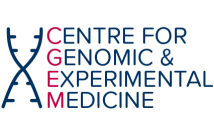School students hosted by Dr Erika Kague through In2STEM programme
The two high school students learnt about the use of zebrafish to study human bone diseases and had the chance to interact with several scientists from across the IGC: July 2024

Rebecca Melville and Amtul Musawir spent a week in the Kague lab at the Centre for Genomic and Experimental Medicine through the In2STEM programme. The programme, run by In2scienceUK, provides opportunities for 16 to 19-year-olds to engage with STEM careers through a variety of activities, including work experience placements in scientific environments. Rebecca and Amtul both observed experiments, met researchers and were able to gain hands-on experience.
Rebecca Melville said: “I wanted to do this to see what it would be like to work in a real-life laboratory in science.”
Amtul Musawir said: “After doing this placement at the IGC, I am really interested in doing research work and gain knowledge to answer key biological questions.”
Versus Arthritis Career Development Fellow Dr Erika Kague leads a research group investigating the molecular mechanisms of human bone diseases, with a focus on osteoarthritis and osteoporosis, using zebrafish as model organism. Both students gained a valuable insight into the use of this model organism to study human disease.
“We got to take the zebrafish embryo that we have been tracking from day one until day five and put them under the microscope," said Rebecca. "We could see every single part of it. It was so cool, we could see its little heart beating. It was really nice to watch their development during the whole week. It was a nice insight into the life of a scientist."

Amtul added: "I really enjoyed exploring and observing the development of zebrafish. It was incredible to learn how these zebrafish contained 70% of the same DNA as we have and how we can use this to research bone diseases like osteoporosis and osteoarthritis. Learning this was of special interest to me since I want to go into medicine."
As well as experiencing what working life would be like in Dr Kague’s research group, Rebecca and Amtul had the opportunity to meet many other scientists at the IGC and to hear about their ongoing research.
Amtul Musawir said: "I was able to gain a very good insight into what a career would be like in research, and I was able to speak to many amazing people within the IGC and their journey, advice and information was very valuable to listen to. Not only that, they helped me to improve and enhance on key practical skills that would be very useful in medicine."
Rebecca Melville added: “I was so lucky to meet such inspiring and welcoming scientists who have further encouraged me to pursue my career in medical sciences.
“I was astonished to learn how quickly and accurately microscopic organisms can be photographed with such high resolution and how we can see so clearly into the organism - down to the organelle!”

Coming from a low-income country and overcoming many challenges to establish my laboratory at the IGC has given me a deep appreciation for the transformative power that a visit to a laboratory or a conversation with a scientist can have in one’s life. I didn't have the chance to look at a cell through a microscope until I was at university, and I didn't speak English, the language of science, until I was a PhD student. People often ask, “How did you end up doing what you do for a living?”
Now, I am thrilled to offer placements to students, share knowledge about my research, recount my journey in academia, and provide them with a glimpse into the life of a scientist. I take great pride in introducing these students to other scientists and nurturing their curiosity. I am deeply committed to inspiring the next generation of scientists and leaders.
Seeing the sparkle in Rebecca’s and Amtul’s eyes and hearing about the positive impact their week in the lab has had on them is incredibly rewarding. I aim to offer placements to students as often as I can, hoping to ignite that same passion for science that drives me.


